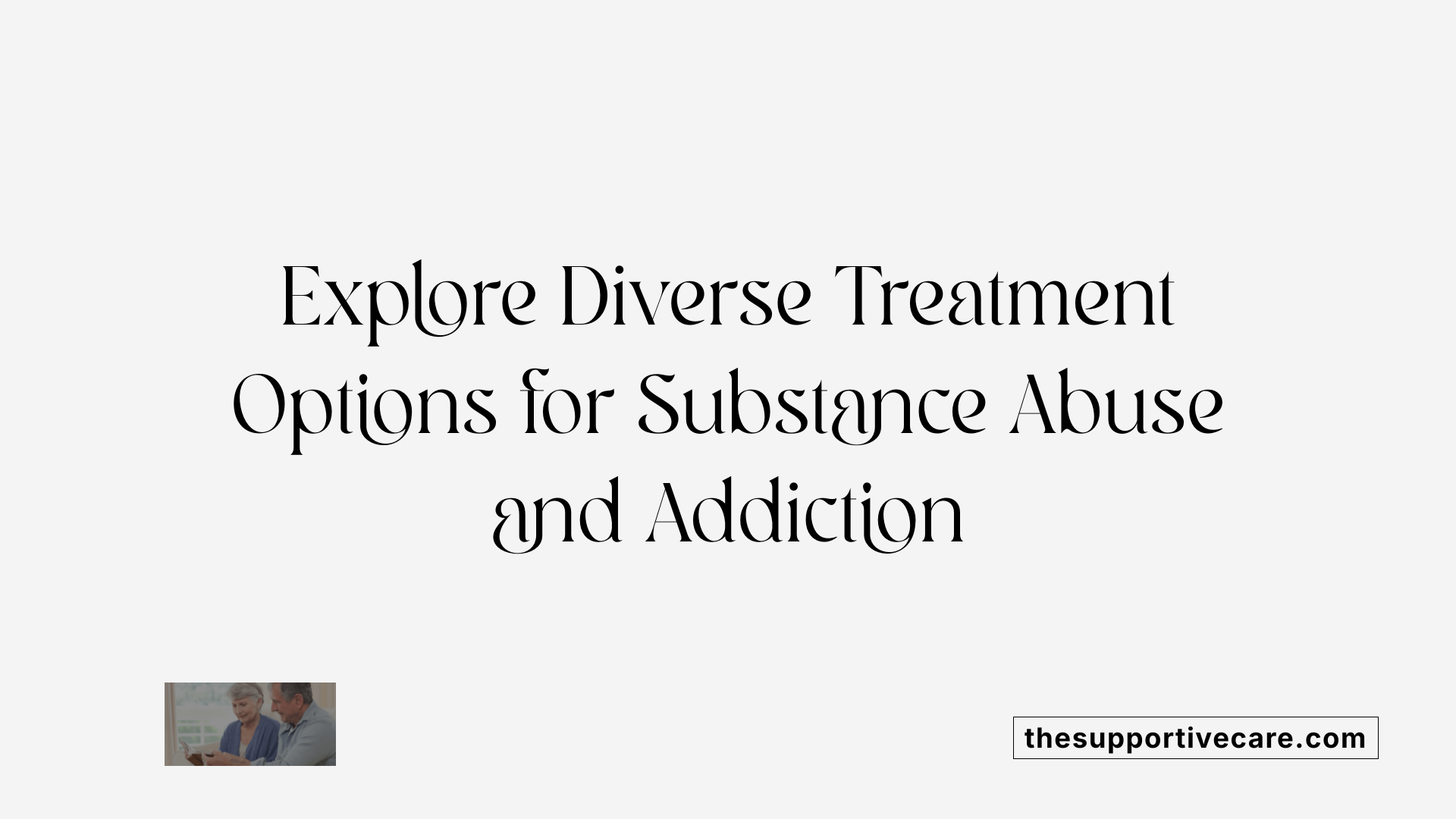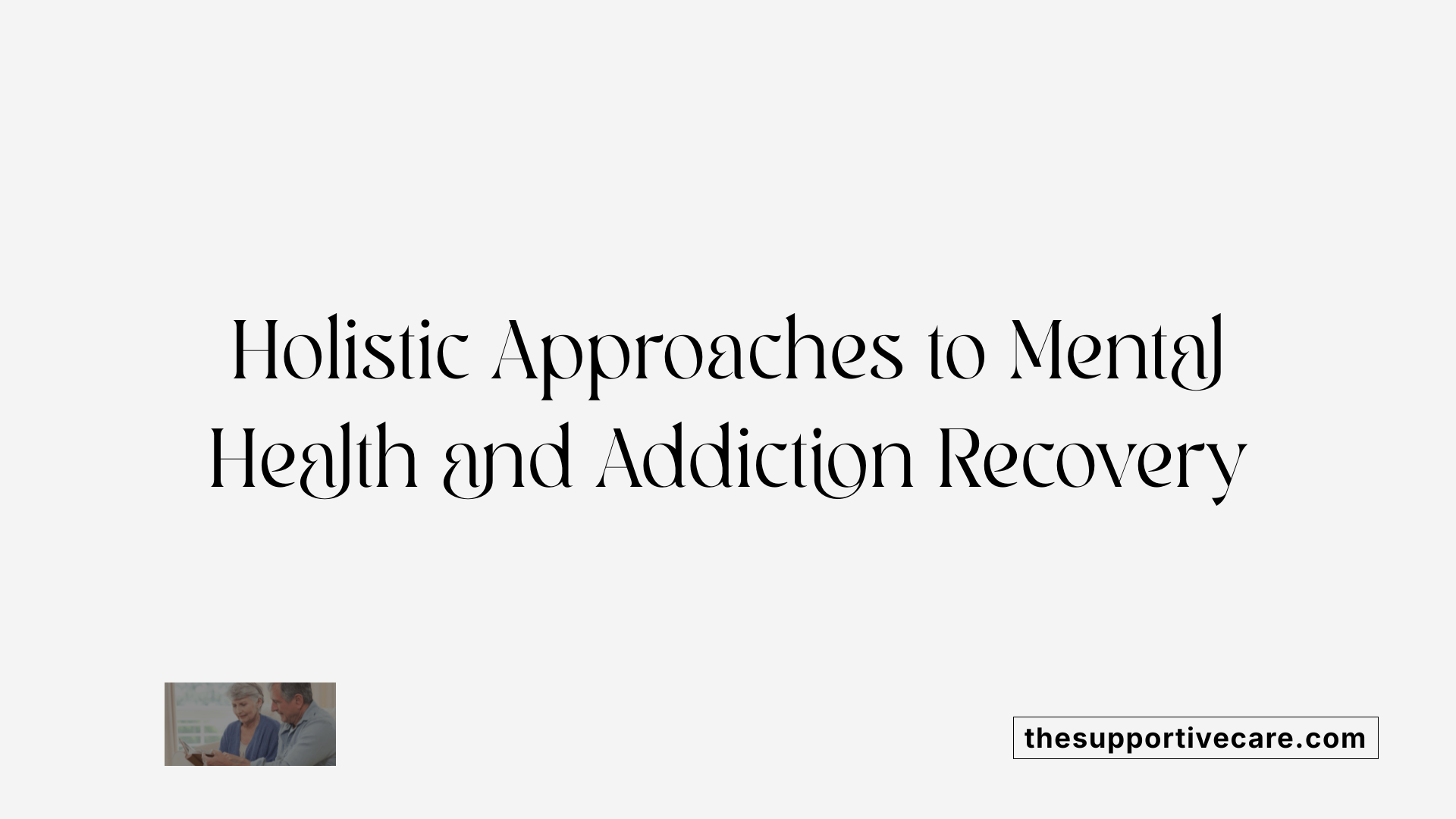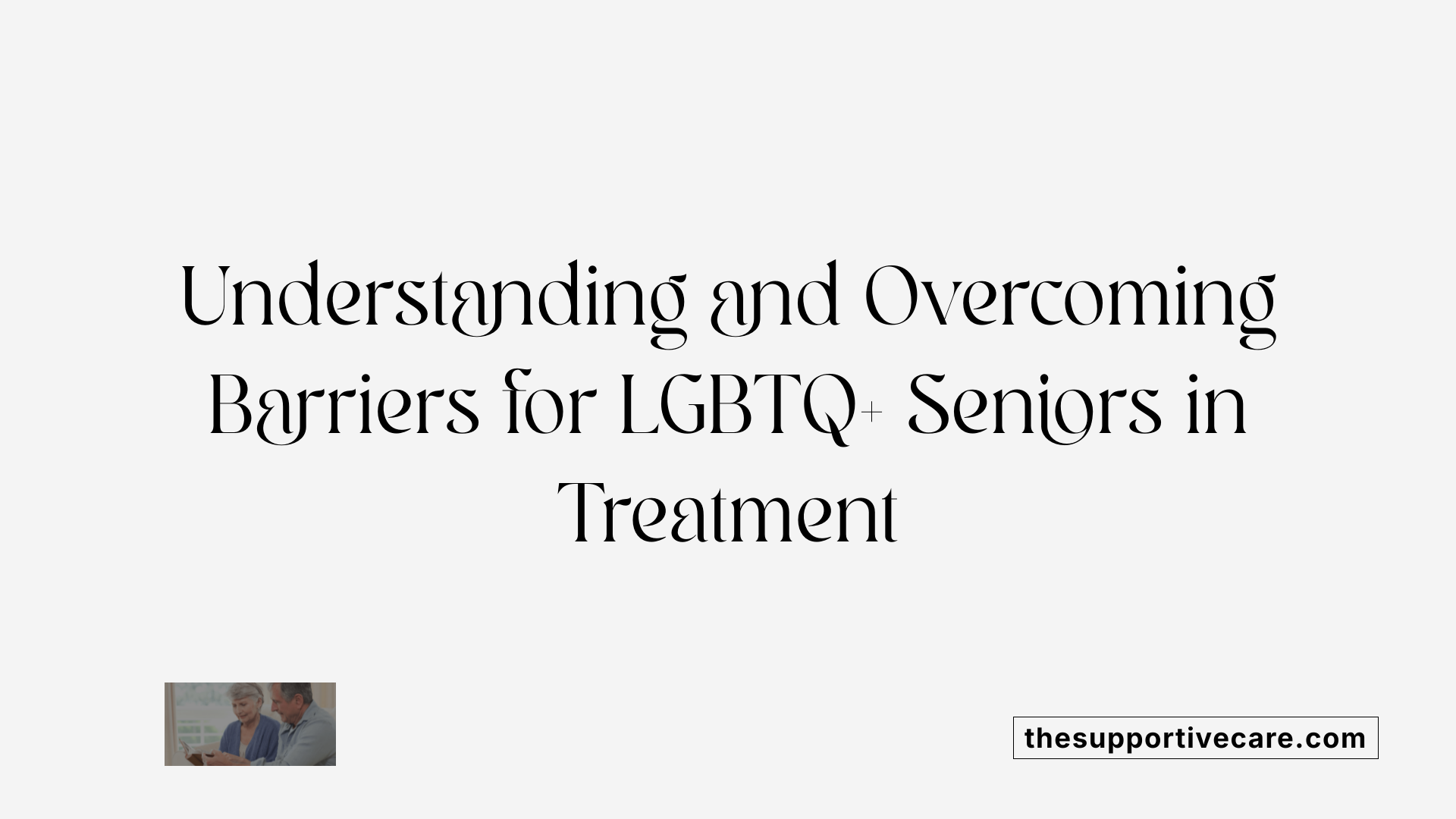Bridging the Gap in Mental Health and Addiction Services for LGBTQ+ Seniors
LGBTQ+ seniors represent a population with unique and pressing needs in mental health and addiction treatment. Due to compounded challenges such as minority stress, discrimination, and social isolation, these individuals experience disproportionate rates of substance use disorders and co-occurring mental health issues. Comprehensive, culturally competent, and affirming services remain limited yet essential to fostering recovery and well-being among LGBTQ+ older adults. This article explores current treatment options, barriers, and promising approaches tailored to support LGBTQ+ seniors with inclusive mental health services.
Understanding the Spectrum of Treatment Services for Substance Abuse and Addiction

What types of treatment services are available for substance abuse and addiction?
Treatment services for substance abuse are diverse and tailored to meet individual needs. They range from medical detoxification, which safely manages withdrawal symptoms, to inpatient and outpatient programs that provide structured care environments.
Tailored interventions for individual needs
Programs often include counseling techniques like cognitive-behavioral therapy (CBT) and motivational interviewing to address the psychological aspects of addiction and co-occurring mental health issues. Specialized treatments, such as those offered by centers like Pride Institute and Hazelden Betty Ford, integrate holistic approaches including yoga, mindfulness, and even sexual health programs designed specifically for LGBTQ+ individuals.
Integration of therapy and medication-assisted treatment (MAT)
Medication-assisted treatment (MAT) is an important component, particularly for opioid and alcohol dependence. Combining MAT with behavioral therapies enhances treatment effectiveness, reduces cravings, and helps prevent relapse.
Continuum of care including aftercare and support groups
Recovery is supported through a continuum of care that extends beyond initial treatment. Aftercare planning involves ongoing counseling, peer support groups—including LGBTQ+-affirming groups—and community resources like the RecoverMe campaign, ensuring lasting engagement and better outcomes.
| Treatment Service | Description | Example & Focus |
|---|---|---|
| Medical Detox | Safe withdrawal management | Medical detox programs in addiction centers |
| Inpatient Programs | Residential, 24/7 structured care | Pride Institute's residential services for LGBTQ+ individuals |
| Outpatient Programs | Flexible, non-residential therapy | Hazelden Betty Ford's outpatient systems with LGBTQ+ inclusivity |
| Counseling & Therapy | CBT, motivational interviewing, trauma-informed care | Specialized sexual health and substance use therapy at Pride Institute |
| Medication-Assisted Treatment (MAT) | Use of medications to reduce cravings and prevent relapse | Integrated MAT in opioid addiction treatment |
| Aftercare & Support | Follow-up care, support groups, peer advocacy | LGBTQ-specific recovery communities and helplines |
Addressing Mental Health Challenges through Integrated Addiction Treatment

How are mental health issues addressed in addiction treatment?
Mental health issues are tackled using integrated treatment approaches that blend mental health counseling, psychiatric evaluations, and medication management alongside addiction therapy. This combined strategy offers a holistic approach that acknowledges the complexity of co-occurring disorders.
Innovative service delivery is pivotal, with expanded use of community outreach, telehealth, and mobile clinics. These efforts boost accessibility, especially for marginalized groups such as LGBTQ+ seniors, who often face unique challenges including social isolation and stigma.
Holistic care also recognizes the impact of social determinants like stable housing, nutrition, and employment on successful recovery. Supporting these needs is critical for reducing health disparities.
Systemic reforms aim to decriminalize behavioral health conditions and revamp crisis response systems to keep individuals out of incarceration. Providers are encouraged to adopt culturally humble practices to create inclusive and affirming environments.
Despite these advances, barriers persist—particularly limited availability of integrated services in predominantly Black and Hispanic communities—indicating a pressing need for targeted policy action to ensure equitable behavioral health treatment for all populations, including LGBTQ+ seniors.
The Central Role of Therapy in Healing Addiction and Mental Health Disorders

What role does therapy play in treating addiction and mental health disorders?
Therapy serves as a cornerstone in the treatment of addiction and mental health issues by offering a safe space where individuals can uncover and address the root causes of their struggles. It incorporates a variety of therapeutic approaches tailored to individual needs, which include cognitive-behavioral therapy (CBT), counseling, and family therapy.
CBT is particularly effective in helping patients recognize and change harmful thought patterns that contribute to substance use and mental health challenges. Counseling complements this by providing emotional support and guidance through recovery hurdles. Family therapy promotes healing beyond the individual by involving loved ones in understanding and supporting the recovery journey.
Throughout therapy, patients learn practical coping strategies to manage symptoms and prevent relapse. Building self-awareness and boosting self-esteem are crucial outcomes, both fostering resilience and empowering sustained recovery. These therapeutic approaches also address specific challenges faced by vulnerable populations such as LGBTQ+ individuals and seniors, ensuring inclusivity and cultural competence.
Ultimately, therapy is part of a comprehensive care plan often combined with medication, community support, and other interventions. This multidimensional treatment model enhances the chances of long-term recovery and improved overall quality of life.
Addressing Common Forms of Addiction in Comprehensive Service Programs

What forms of addiction are commonly treated in comprehensive service programs?
Comprehensive service programs address a broad spectrum of addictions. They commonly treat substance use disorders involving alcohol, opioids, marijuana, methamphetamine, and other illicit drugs, given their prevalence and the associated health risks.
In addition to substance use, many programs also tackle behavioral addictions such as gambling, internet addiction, and gaming disorders. These non-substance-related addictions can significantly impact mental health and daily functioning.
Crucially, many individuals entering treatment have co-occurring mental health disorders like anxiety, depression, and trauma-related conditions. Integrated care models are therefore essential, providing simultaneous treatment for both addiction and underlying mental health issues to improve outcomes.
Specialized treatment approaches are necessary to address complex profiles, such as those found in LGBTQ+ individuals who often face additional challenges due to stigma, discrimination, and minority stress. Tailored programs incorporate affirming clinical environments and address unique psychosocial needs.
By combining support for substance use, behavioral addictions, and co-occurring disorders within an inclusive framework, comprehensive programs promote holistic and sustained recovery.
Challenges and Barriers Facing LGBTQ+ Seniors in Addiction and Mental Health Care

Higher Rates of Substance Use and Co-occurring Disorders
LGBTQ+ seniors face significantly higher rates of substance use and co-occurring mental health disorders compared to their heterosexual peers. According to SAMHSA and the National Survey on Drug Use and Health, substance use disorders in LGBTQ+ populations are approximately 20-30%, far exceeding the 9% prevalence in the general population. These disparities often stem from long-term exposure to stressors unique to their identities.
Impact of Minority Stress Including Stigma and Discrimination
Minority stress plays a critical role in the health outcomes of LGBTQ+ seniors. They frequently experience stigma, discrimination, and social rejection that contribute to anxiety, depression, and internalized homophobia. These stressors intensify risks for substance misuse and complicate recovery efforts.
Experiences of Misgendering and Denial of Services
LGBTQ+ seniors report mistreatment in healthcare settings through misgendering, name-calling, and at times outright denial of services. Such experiences occur on multiple levels—from patients, staff, and institutional policies—leading to identity concealment and reluctance to pursue treatment.
Scarcity of LGBTQ+ Affirming Substance Use Treatment Programs
Access to culturally competent, LGBTQ+ affirming substance use treatment remains severely limited. Fewer than 20% of state-approved substance abuse programs and about 12.6% of mental health facilities offer LGBTQ-specific services. This scarcity disproportionately affects older LGBTQ+ adults, whose treatment needs are often overlooked.
Intersection of Age-Related Stigma and Social Isolation
Aging LGBTQ+ individuals face compounded challenges including ageism, social isolation, and physical health issues. These factors increase vulnerability to substance misuse and mental health decline, underscoring the necessity for tailored services that address both age-related and identity-based barriers.
Structural Factors Influencing Treatment Availability
Structural barriers such as religious affiliations of treatment facilities, lack of inclusive policies, and insufficient staff training reduce the availability of LGBTQ+ specific programs. Additionally, the correlation between higher LGBTQ+ population densities and availability of affirming mental health services is inconsistent for substance abuse facilities, highlighting systemic gaps.
By understanding these multifaceted challenges, healthcare systems can prioritize developing and expanding inclusive, affirmative, and accessible treatment options designed to support the unique needs of LGBTQ+ seniors.
Promising Models and Strategies for Inclusive LGBTQ+ Senior Mental Health Services
LGBTQ-affirming treatment programs and holistic care
Effective treatment for LGBTQ+ seniors incorporates affirming care that respects diverse identities and experiences. Programs emphasize acceptance, understanding, and culturally competent approaches. Holistic care techniques, such as those integrating yoga, mindfulness meditation, and cognitive-behavioral therapy, support mental well-being alongside substance use recovery.
Importance of non-discrimination policies and staff training
Non-discrimination policies and specialized staff training are crucial to fostering safe, inclusive environments. They help reduce stigma and minority stress, ensuring LGBTQ+ seniors receive respectful treatment without fear of exclusion.
Inclusion of community-building and supportive spaces
Community-building with LGBTQ+ peers and visible affirmations—like rainbow flags—create supportive spaces that enhance resilience and engagement in treatment. Sober community venues and advocacy from affirming staff contribute to sustained recovery and social connection.
Specialized programs from Pride Institute and Hazelden Betty Ford
Institutions such as Pride Institute and Hazelden Betty Ford offer tailored addiction and mental health programs specifically designed for LGBTQ+ individuals. Services include residential and outpatient care, partial hospitalization, and telehealth options. These programs address unique challenges such as internalized stigma, sexual health, and co-occurring trauma.
Innovative tools: Telehealth and mindfulness techniques
The integration of telehealth expands access to inclusive care, overcoming barriers related to transportation and scheduling. Mindfulness and other holistic techniques complement conventional therapies, nurturing emotional regulation and stress management.
Role of organizations providing tailored mental health support
Organizations like The Trevor Project, Pride Counseling, and the National LGBT Health Education Center offer vital mental health resources tailored for LGBTQ+ individuals. Their services augment treatment programs by providing specialized counseling, crisis support, and educational materials.
| Strategy/Program | Description | Benefits for LGBTQ+ Seniors |
|---|---|---|
| Affirming Treatment & Holistic Care | Yoga, mindfulness, cognitive-behavioral therapy integrated | Addresses mental health and substance use in inclusive manner |
| Non-Discrimination Policies & Training | Policies and staff education to ensure respectful treatment | Reduces stigma and discrimination |
| Community Building | Peer support, affirming symbols, sober venues | Enhances resilience and treatment retention |
| Specialized Programs | Pride Institute, Hazelden Betty Ford tailored services | Customized care addressing unique LGBTQ+ senior needs |
| Telehealth & Innovative Therapies | Remote counseling and mindfulness exercises | Increases accessibility and emotional well-being |
| Dedicated Organizations | Trevor Project, Pride Counseling, National LGBT Health Center | Provides specialized mental health and crisis support |
Towards Equitable and Affirming Care for LGBTQ+ Seniors
Improving mental health and addiction services for LGBTQ+ seniors requires dedicated attention to inclusivity, cultural competence, and holistic treatment approaches that address both substance use and co-occurring mental health conditions. By implementing specialized, affirming programs and dismantling systemic barriers, the healthcare landscape can evolve to meet the unique challenges faced by this vulnerable community. Expanding access to LGBTQ+-specific treatment options, fostering supportive environments, and integrating comprehensive care models will enhance recovery outcomes and quality of life for LGBTQ+ older adults, demonstrating a vital commitment to health equity and dignity.
References
- Home | SAMHSA - Substance Abuse and Mental Health ...
- Experiences of and recommendations for LGBTQ+-affirming ...
- The value of specialized LGBTQ substance abuse treatment
- Addiction & Mental Health Resources for the LGBTQ+ ...
- The availability of LGBT‐specific mental health and ...
- LGBTQ+ & Gay-Friendly Drug and Alcohol Rehab at Pride ...
- LGBTQ Drug Rehab & Mental Health Care
- Tailoring substance use recovery for LGBTQ+ people
- Transforming Mental Health And Addiction Services
- Lessons learned from implementing integrated mental ...



































































































